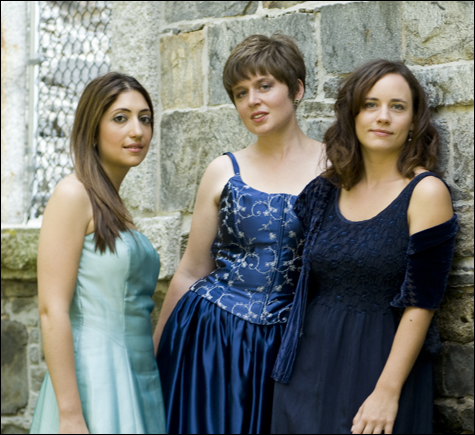
IN THREE PARTS: The Bayside Trio. |
| Bayside Trio | October 24 at 7:30 pm | at Saco River Grange Hall, Bar Mills | $12 | 207.929.6472 | October 25 at 7:30 pm | at Lorimer Chapel, Colby College, Waterville | Free | 207.859.5670 | October 26 at 7:30 pm | at St Luke’s Cathedral, 143 State St, Portland | $10 | 207.772.5434 |
The Bayside Trio push the boundaries of modern classical music, performing works by living or recent composers. For some classical concert-goers, the group’s edgy program selections might be difficult to digest. But the Bayside Trio perform for those who wish to see something different, something new, something alive.
“So many of my favorite modern composers came to classical music from a different place, like jazz or folk music,” says pianist Anastasia Antonacos. “The first classical composer they all seem to discover is Stravinsky and then they travel backward in time from there.”
For their weekend of concerts the Bayside Trio will perform two works with mezzo-soprano Solange Merdinian: Maurice Ravel’s Chansons Madécasses for mezzo-soprano, flute, cello, and piano, and Armenian composer Tigran Mansurian’s Three Madrigals. The concert will open with Argentine tango composer Astor Piazzolla’s Four Seasons of Buenos Aires.
Cellist Ani Kalayjian discovered Mansurian a year ago at a concert in New York City. “We were looking for an ethnic work to represent our roots,” explains Kalayjian, who is of Armenian descent. “And he happened to have the score [for the Madrigals] with him from Armenia.”
The poems used in two out of the three madrigals the Bayside Trio will perform are written in Armenian; the final one is in Italian. The composer does not speak English, which has made communicating with him a challenge for the trio. However, the Armenian community is very close and Kalayjian has been able to find a translator for the two Armenian poems.
“We needed an Armenian singer for this piece because of the difficulty of pronouncing the words,” says Antonacos. “Solange is half Armenian and half Argentine, which is perfect.”
Merdinian is currently enrolled in a master’s program at Bard College. Recently she and Kalayjian were the co-artistic directors of an all-Armenian musician performance at Carnegie Hall, in which the musicians performed a variety of works, including many by Armenian composers.
“Mansurian has his own voice,” says Kalayjian. “There are places where the piece sounds Armenian, but each madrigal has its own flavor. The music is simple, atmospheric. It starts out with the whole trio, then piano alone, then the whole group again. The pieces are gorgeous.”
“There are no recordings [of the Madrigals],” explains Antonacos. “We are trying to piece it together. It has some interesting harmonies, a little jazz influence, as well as Eastern European influences.”
Because both Merdinian and Kalayjian live in New York City, the group will have only a week to put together the four difficult and modern works on their program. “We just won’t do anything else but practice,” says Antonacos.
In addition to the Piazzolla, Ravel, and Mansurian, the October 25 concert at Colby College in Waterville will include composer George Crumb’s Vox Balaenae (Voice of the Whale), which the group performed last year at the University of Southern Maine School of Music. The eerie work requires the performers to wear black masks and perform under dramatic, dark blue lighting, which is impossible at several of their current venues: The Saco River Grange Hall in Bar Mills and St. Luke’s Cathedral in Portland do not have the necessary technical equipment.
Despite those challenges, the Bayside Trio seem excited about the upcoming concert series. The trio generally perform only twice a year due to scheduling and distance difficulties, however each performance presents an opportunity for them to explore works written for this unusual grouping of instruments.
“When you present a program that’s creative and exciting, it’s fun,” explains Kalayjian. “We truly love the pieces we pick.”
Emily Parkhurst can be reached at emily.parkhurst@yahoo.com.